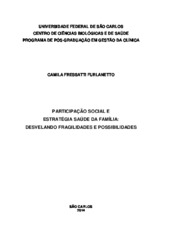| dc.contributor.author | Furlanetto, Camila Fressatti | |
| dc.date.accessioned | 2018-02-01T18:22:56Z | |
| dc.date.available | 2018-02-01T18:22:56Z | |
| dc.date.issued | 2014-03-26 | |
| dc.identifier.citation | FURLANETTO, Camila Fressatti. Participação social e estratégia saúde da família : desvelando fragilidades e possibilidades. 2014. Dissertação (Mestrado em Gestão da Clínica) – Universidade Federal de São Carlos, São Carlos, 2014. Disponível em: https://repositorio.ufscar.br/handle/ufscar/9368. | * |
| dc.identifier.uri | https://repositorio.ufscar.br/handle/ufscar/9368 | |
| dc.description.abstract | The participation and the social control are guiding principles of SUS and for democratization of the system. The health acting and services management should express joint definitions between the government and population. The 8.142/1990 Law establishes as instances for participation and social control in the Health the counsels and the conferences. The Family Health Strategy (FHS) could be considered an easier locus of the materialization of the social participation because of the link possibility with the user population. Considering this hypothesis, the research sought to analyze the users and Health worker’s perceptions of the Family for the social participation, seeking for the social effective control in health. It was held with workers and users of two Family Health Units in the São Carlos county, from the qualitative analysis, up with the application of semi structured interviews and thematic analysis, whose origins three categories(i) challenges for the effectiveness of the social participation in the FHS; (ii) participation spaces or just completion of formalities?; (iii) FHS: potentiality for social participation. The results of this study allowed unveiling various fragilities that figures as challenges for the social participation in the researching field, such as: lack of information/comprehension, exposition and power relations and welfares/accommodation. The institutionalized spaces for the participation and social control addressed in this study were the Municipal Health Conferences and the locals Management Councils, the effectiveness of them were analyzed negatively due lack of support and government participation. The research allowed unveiling also potentials as the counsels’ effort and the capacity spaces done between the team and the users members of the Management Councils in the Family Heath Units. Lastly, the participants perception strengthens the challenge that is the social participation in the SUS. As contribution, the needing pointing of more investment and attention to this spaces from the recognition of their potentialities. | eng |
| dc.description.sponsorship | Não recebi financiamento | por |
| dc.language.iso | por | por |
| dc.publisher | Universidade Federal de São Carlos | por |
| dc.rights.uri | Acesso aberto | por |
| dc.subject | Controle social | por |
| dc.subject | Estratégia saúde da família | por |
| dc.subject | Participação social | por |
| dc.subject | Sistema único de saúde | por |
| dc.subject | Social control | eng |
| dc.subject | Family health | eng |
| dc.subject | Social participation | eng |
| dc.title | Participação social e estratégia saúde da família : desvelando fragilidades e possibilidades | por |
| dc.type | Dissertação | por |
| dc.contributor.advisor1 | Machado, Maria Lúcia Teixeira | |
| dc.contributor.advisor1Lattes | http://lattes.cnpq.br/5703683100332513 | por |
| dc.contributor.advisor-co1 | Ogata, Márcia Niituma | |
| dc.contributor.advisor-co1Lattes | http://lattes.cnpq.br/3274294833403570 | por |
| dc.description.resumo | A participação e o controle social são princípios norteadores do SUS e para democratização do sistema. A gestão e organização das ações e serviços de saúde devem expressar definições conjuntas entre o poder público e população. A Lei 8.142/1990 estabelece como instâncias para participação e controle social na saúde os conselhos e as conferências. A Estratégia Saúde da Família pode ser considerada um lócus facilitador da materialização da participação social devido à possibilidade de vínculo com a população usuária. Considerando esta hipótese a pesquisa buscou analisar as percepções dos usuários e trabalhadores da Saúde da Família em relação à participação social, visando o efetivo controle social em saúde. A partir de abordagem qualitativa de pesquisa, foram realizadas entrevistas semiestruturadas com trabalhadores e usuários de duas Unidades de Saúde da Família no Município de São Carlos e posterior análise temática, que deu origem a três categorias: (i) desafios para a efetivação da participação social na ESF; (ii) espaços de participação ou “cumprimento de tabela?”; (iii) ESF: potencialidade para a participação social. Os resultados deste estudo permitiram desvelar diversas fragilidades que se configuram como desafios para a participação social no território pesquisado, tais como: falta de informação/compreensão, exposição e relações de poderes e assistencialismo/acomodação. Os espaços institucionalizados para a participação e controle social abordados neste estudo foram as Conferências Municipais de Saúde e os Conselhos Gestores locais. A efetivação dos mesmos foi analisada negativamente devido à falta de apoio e participação da gestão municipal. A pesquisa permitiu desvelar também potencialidades como o empenho dos conselheiros e os espaços de capacitação realizados entre equipe e usuários membros do Conselho Gestor nas Unidades de Saúde da Família. Por fim, a percepção dos participantes reforça o desafio que é a participação social no SUS. Como contribuição o apontamento da necessidade de maior investimento e atenção a estes espaços a partir do reconhecimento de suas potencialidades. | por |
| dc.publisher.initials | UFSCar | por |
| dc.publisher.program | Programa de Pós-Graduação em Gestão da Clínica - PPGGC | por |
| dc.subject.cnpq | CIENCIAS DA SAUDE | por |
| dc.ufscar.embargo | Online | por |
| dc.publisher.address | Câmpus São Carlos | por |
| dc.contributor.authorlattes | http://lattes.cnpq.br/5029350333934696 | por |
